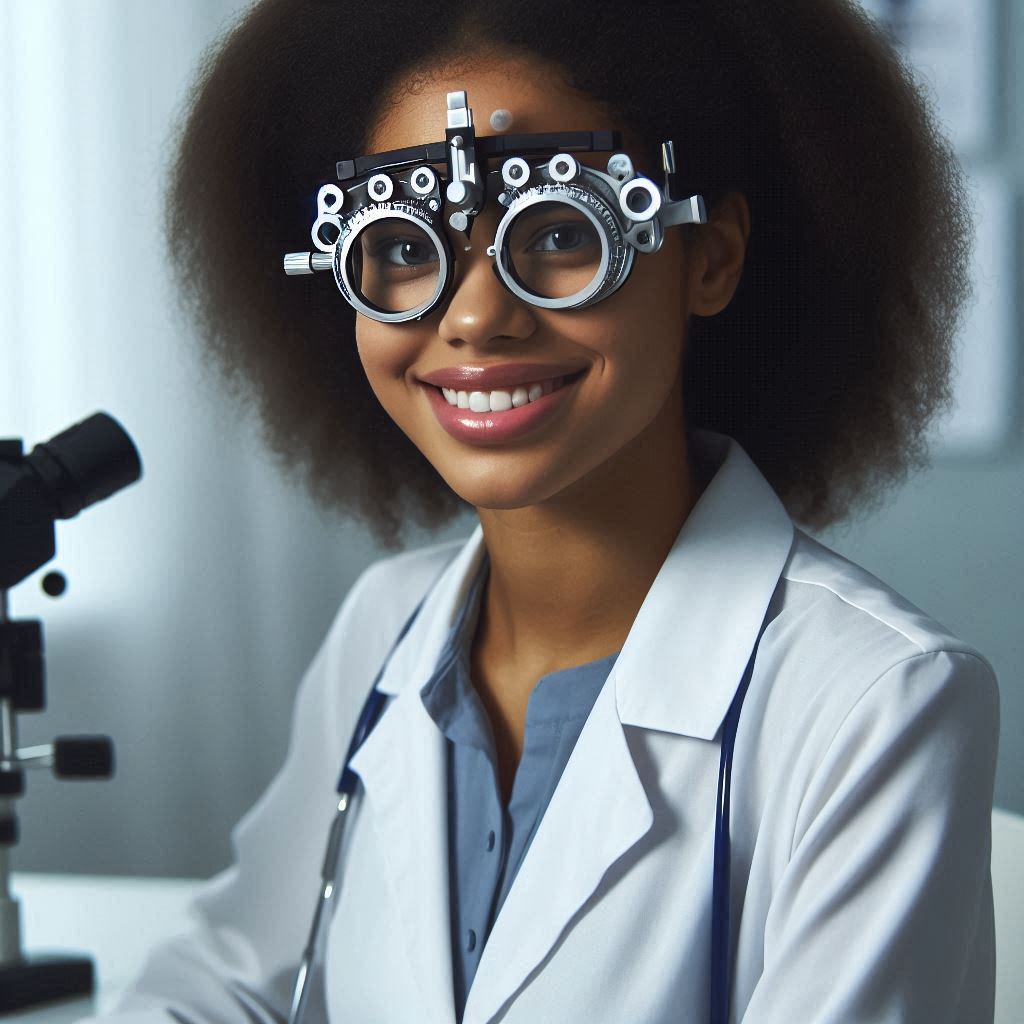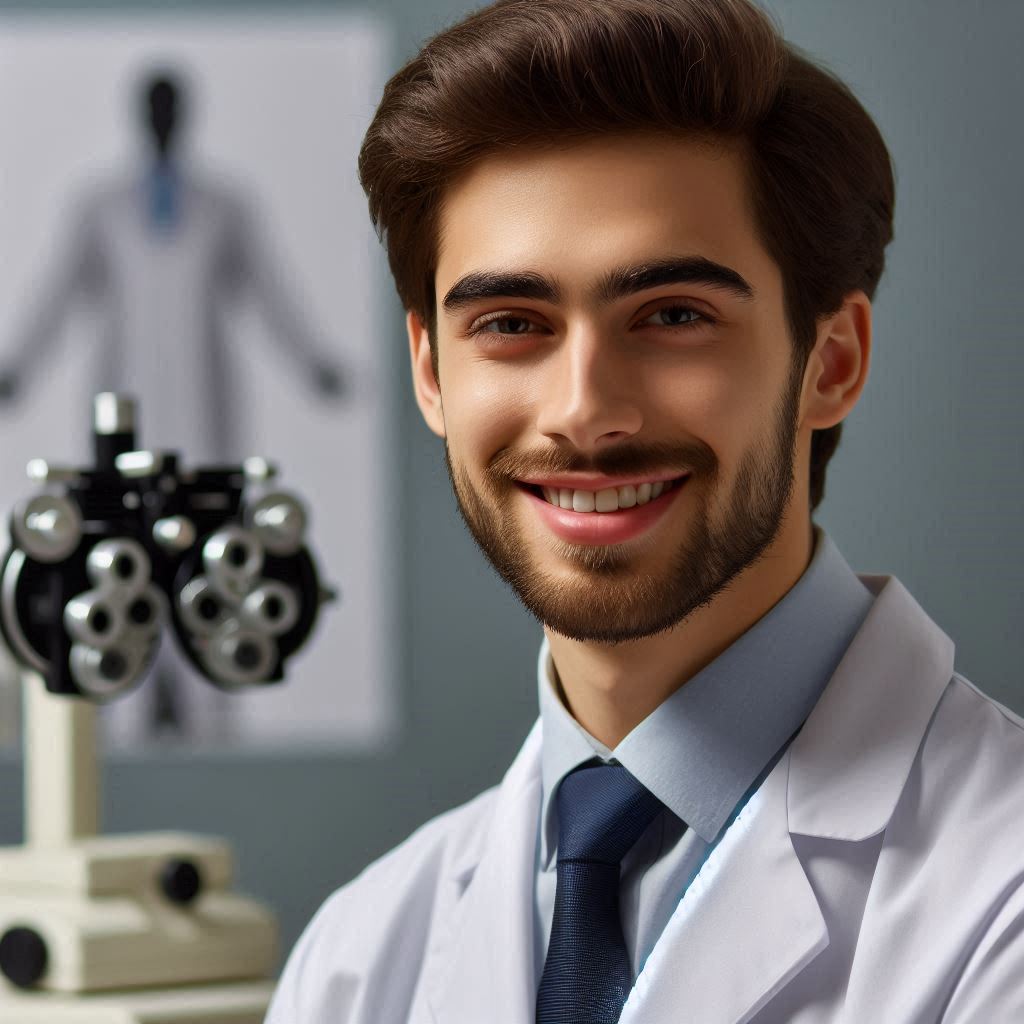Introduction
Proper eye health is essential for overall well-being. Optometrists play a crucial role in diagnosing and treating various eye diseases.
Diagnosis
Optometrists use advanced technology to assess eye conditions accurately.
They perform comprehensive eye exams to detect early signs of diseases.
Dilation of the pupils allows optometrists to have a better view of the internal structures of the eye.
Specialized tests like visual field exams and retinal imaging help in diagnosing specific conditions.
Treatment
Optometrists develop personalized treatment plans based on the diagnosis.
Prescription glasses or contact lenses are often used to correct refractive errors.
For conditions like glaucoma, optometrists may prescribe eye drops to manage intraocular pressure.
They may also co-manage surgical procedures with ophthalmologists for more complex cases.
Monitoring
Regular follow-up appointments are crucial to ensure the effectiveness of the treatment.
Optometrists monitor changes in vision and adjust treatment plans accordingly.
Early detection and timely intervention can prevent vision loss in many cases.
Patient education on eye health and disease prevention is also a key aspect of optometric care.
Optometrists play a vital role in diagnosing and treating eye diseases to preserve vision and enhance quality of life.
Regular eye exams with an optometrist are essential for maintaining optimal eye health.
Education and Training of Optometrists
Optometrists are healthcare professionals who specialize in the diagnosis, treatment, and management of eye diseases and disorders.
They play a crucial role in maintaining the overall health of our eyes. In order to become a qualified optometrist, individuals must undergo rigorous education and training to acquire the necessary skills and knowledge to provide excellent eye care services.
Educational Requirements to Become an Optometrist
- Completion of a Bachelor’s degree: Before applying to optometry school, candidates must first complete a Bachelor’s degree, preferably in a science-related field.
- Optometry school: After completing their undergraduate studies, aspiring optometrists must enroll in an accredited optometry school for a Doctor of Optometry (OD) degree.
- Clinical training: As part of their optometry program, students undergo extensive clinical training to gain hands-on experience in treating patients under the supervision of experienced optometrists.
- Licensure: After graduating from optometry school, individuals must pass the national board exams to obtain a state license to practice optometry.
Importance of Ongoing Training and Continuing Education
- Advancements in technology: Ongoing training allows optometrists to stay current with the latest technological advancements in eye care, such as new diagnostic tools and treatment options.
- Changes in healthcare: With the constantly evolving healthcare landscape, continuing education ensures that optometrists are well-equipped to navigate regulatory changes and provide the best possible care for their patients.
- Specialization: Optometrists may choose to specialize in specific areas of eye care, such as pediatric optometry or low vision, through additional training and certification programs.
How Optometrists Stay Updated on the Latest Advancements in Eye Health
- Attending conferences and seminars: Optometrists regularly attend conferences and seminars to learn about new research findings, treatment techniques, and best practices in eye care.
- Online courses and webinars: Online platforms offer optometrists the opportunity to participate in virtual courses and webinars on a wide range of eye health topics.
- Peer collaboration: Optometrists often collaborate with colleagues in the field to discuss challenging cases, share knowledge, and exchange ideas for improving patient care.
Overall, the education and training of optometrists are essential for ensuring that they have the skills, knowledge, and expertise necessary to diagnose and treat a variety of eye diseases and disorders.
By staying updated on the latest advancements in eye health through ongoing training and continuing education, optometrists can provide their patients with the highest quality of care.
Read: Certifications and Licensing Requirements for Orthotists/Prosthetists
Transform Your Career Today
Unlock a personalized career strategy that drives real results. Get tailored advice and a roadmap designed just for you.
Start NowCommon Eye Diseases Diagnosed by Optometrists
Common eye diseases
- Cataracts: Cataracts involve clouding of the eye’s lens, leading to blurry vision.
- Glaucoma: Glaucoma is a group of eye conditions that damage the optic nerve.
- Macular Degeneration: Macular degeneration affects the retina’s central area, leading to vision loss.
Symptoms and Risk Factors
- Cataracts: Symptoms include cloudy vision, faded colors, and sensitivity to glare. Risk factors include aging, diabetes, and smoking.
- Glaucoma: Symptoms include blurred vision, headache, and nausea. Risk factors include family history, age, and ethnicity.
- Macular Degeneration: Symptoms include blurred or distorted vision. Risk factors include age, genetics, and smoking.
Importance of Early Detection and Treatment
Early detection of eye diseases is crucial to prevent vision loss. Optometrists play a vital role in diagnosing these conditions through comprehensive eye exams.
By identifying symptoms and risk factors early, optometrists can recommend appropriate treatment options to manage and improve the condition.
This proactive approach can significantly impact the patient’s quality of life and visual acuity.
Regular eye exams are essential in detecting eye diseases in their early stages, allowing for timely intervention to preserve vision and prevent further complications.
Optometrists can provide personalized care and treatment plans tailored to each patient’s unique needs, ensuring optimal outcomes and long-term eye health.
It is essential to prioritize regular eye exams and proactive management of eye diseases to maintain healthy vision and overall well-being.
By working closely with optometrists and following their recommendations, individuals can take control of their eye health and minimize the risk of developing serious vision problems.
Remember, early detection is key in the prevention and treatment of eye diseases.
So, schedule your next eye exam today to ensure your eyes stay healthy for years to come.
Read: Pediatric Optometry: What Parents Need to Know

Diagnostic Tools Used by Optometrists
When it comes to diagnosing and treating eye diseases, optometrists rely on a variety of diagnostic tools to assess eye health.
These tools are essential in helping optometrists make accurate diagnoses and provide appropriate treatment for their patients.
Importance of Comprehensive Eye Exams
- Comprehensive eye exams are crucial in detecting eye diseases early on.
- Regular eye exams can help prevent vision loss and maintain overall eye health.
- Early detection of eye diseases can lead to better treatment outcomes.
Various Diagnostic Tools
- Visual Acuity Test: This test measures how well you can see at various distances.
- Slit Lamp Examination: This tool allows optometrists to examine the structures of the eye in detail.
- Retinal Imaging: This technology provides detailed images of the back of the eye.
- Tonometry: This test measures the pressure inside the eye, which is important in detecting glaucoma.
How Diagnostic Tools Help Optometrists
- Diagnostic tools provide optometrists with objective data about a patient’s eye health.
- These tools help optometrists identify and monitor changes in eye health over time.
- Accurate diagnoses allow optometrists to provide personalized treatment plans for each patient.
In short, diagnostic tools play a critical role in the practice of optometry.
They enable optometrists to assess eye health accurately, detect eye diseases early, and provide appropriate treatment for their patients.
Regular comprehensive eye exams are essential in maintaining good eye health and preventing vision loss.
By utilizing various diagnostic tools, optometrists can ensure that their patients receive the best possible care for their eyes.
Read: How to Prepare for Your First Visit to an Optometrist
Treatment Options for Eye Diseases
Different treatment options for common eye diseases
Common treatment options for eye diseases include medications, surgery, and lifestyle changes.
Medications are often prescribed to manage symptoms and slow the progression of certain eye conditions.
Showcase Your Business Today
Reach thousands of readers actively exploring professional services. Publish your business profile and grow your audience now.
Publish NowSurgery may be necessary in cases where medication alone is not effective or if the condition is advanced.
Lifestyle changes, such as quitting smoking or maintaining a healthy diet, can also play a significant role in managing eye diseases.
Role of Medication
Medications for eye diseases can help reduce inflammation, control intraocular pressure, and improve overall eye health.
Eye drops are a common form of medication used to treat conditions like glaucoma, dry eye syndrome, and allergies.
Oral medications may also be prescribed for certain conditions, such as macular degeneration or diabetic retinopathy.
Patient compliance is crucial when taking medications for eye diseases to ensure optimal treatment outcomes.
Role of Surgery
Surgical procedures may be recommended for a variety of eye diseases, including cataracts, retinal detachments, and glaucoma.
Cataract surgery involves removing the clouded lens and replacing it with an artificial one to restore clear vision.
Retinal detachment surgery aims to reattach the retina to the back of the eye to prevent vision loss.
Glaucoma surgery can help improve drainage and reduce pressure in the eye to prevent optic nerve damage.
Role of Lifestyle Changes
Adopting healthy lifestyle habits can benefit overall eye health and reduce the risk of developing certain eye diseases.
Quitting smoking can lower the risk of developing age-related macular degeneration, cataracts, and other eye conditions.
Maintaining a balanced diet rich in antioxidants, vitamins, and minerals can promote good eye health and prevent degenerative diseases.
Regular exercise and adequate sleep can also help reduce the risk of eye diseases and improve overall well-being.
Importance of Regular Follow-Ups
Regular follow-up appointments with optometrists are essential for monitoring the progress of eye diseases and adjusting treatment plans accordingly.
Optometrists can track changes in eye health, assess the effectiveness of treatment options, and address any new concerns or symptoms.
Early detection of complications or disease progression can lead to timely interventions to prevent further vision loss or damage.
Building a strong relationship with your optometrist and following their recommendations can help manage eye diseases effectively and maintain good vision.
Read: Top Universities for Orthotist/Prosthetist Programs
Importance of Preventive Care
Significance of preventive care in maintaining eye health
Preventive care is a fundamental aspect of maintaining good health, and this holds true for eye health as well.
By taking proactive steps to prevent eye diseases, individuals can reduce the risk of vision loss and maintain clear vision for years to come.
Emphasizing the significance of preventive care in maintaining eye health is essential.
Regular eye exams are a cornerstone of preventive care, as they allow optometrists to detect and address any potential issues early on, before they develop into more serious conditions.
Tips for preventing eye diseases such as wearing sunglasses and maintaining a healthy diet
Aside from regular eye exams, there are several practical tips that individuals can follow to prevent eye diseases.
One of the most important steps is to protect the eyes from harmful UV rays by wearing sunglasses with UV protection.
This simple habit can help reduce the risk of conditions such as cataracts and macular degeneration.
In addition to wearing sunglasses, maintaining a healthy diet is also crucial for eye health.
Foods rich in vitamins A, C, and E, as well as antioxidants, can help protect the eyes from damage and reduce the risk of age-related eye conditions.
Optometrists can provide guidance on the right foods to include in a diet for optimal eye health.
Role of optometrists in providing guidance on preventive measures
Optometrists play a vital role in educating patients on preventive measures for maintaining eye health.
During eye exams, optometrists can discuss lifestyle habits that can impact eye health, such as smoking and excessive screen time.
By providing guidance on preventive measures, optometrists empower patients to take control of their eye health and reduce the risk of developing eye diseases.
Overall, preventive care is key to preserving eye health and preventing vision problems.
By prioritizing regular eye exams, following tips for preventing eye diseases, and seeking guidance from optometrists, individuals can protect their vision and enjoy clear eyesight for years to come.
Conclusion
In this blog post, we explored how optometrists play a crucial role in diagnosing and treating various eye diseases.
Optometrists use advanced techniques to assess vision and detect conditions early. They provide personalized treatment plans tailored to each patient’s needs.
Regular eye check-ups are vital to maintaining good eye health. Optometrists emphasize preventive care and educate patients on proper eye care practices.
It’s essential to prioritize eye health and seek professional help promptly for any concerns.
By visiting optometrists regularly, individuals can ensure early detection and effective management of eye diseases. Remember, proactive ey
[E-Books for Sale]
The Big Book of 500 High-Paying Jobs in America: Unlock Your Earning Potential
$19.99 • 500 High-Paying Jobs • 330 pages
Explore 500 high-paying jobs in America and learn how to boost your career, earn more, and achieve success!
See All 500 High-Paying Jobs of this E-Book
1001 Professions Without a Degree: High-Paying American Jobs You Can Start Now
$19.99 • 1001 Professions Without a Degree • 174 pages
Discover 1001 high-paying jobs without a degree! Unlock career tips, skills, and success strategies for just $19.99!




